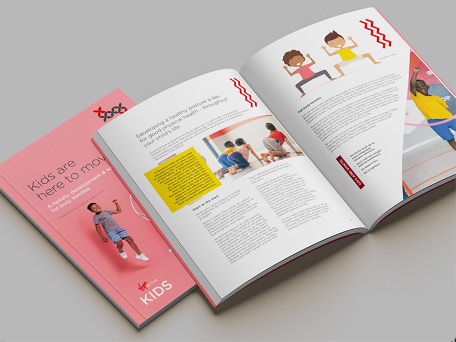IT’S impossible to discuss children’s health and wellness without considering the impact that two years of COVID-19-related lockdowns have had on their mental and physical health. The closure of schools and parks, as well as the cancellation of sports and physical activity classes, played a major role in preventing kids from reaching the recommended levels of physical activity required to help them develop and maintain a healthy lifestyle. As early as 2012, silent pandemics of obesity and physical inactivity existed – and lockdown only amplified the challenges posed by those pandemics.
Experts agree that for healthy growth and development, preschool-aged children should be physically active throughout the day for a minimum of 180 minutes – at least 60 minutes of which should be energetic play that raises their heart and breathing rates. When it comes to school-aged children and adolescents, they should be doing at least 60 minutes of daily physical activity to raise their heart rate, make them breathe harder and sweat more.
Combined with historic low numbers of activity and more than two years of limited activity, are our children moving as much as necessary to keep them healthy? Alarmingly not.
A recent study found that children’s screen time has increased from 3.8 hours pre-pandemic to 7.7 hours daily. Add to that the global obesity prevalence that is also steadily rising – in South Africa it is estimated that 16% of our kids are overweight or obese – and it becomes clear that decreased physical activity and increased sedentary behaviour has led to a pandemic within a pandemic; one that can’t be eased by vaccination, but rather by action.
Physical activity helps to prevent cardiovascular and other chronic diseases. Exercise is also associated with better academic achievement, and has a wealth of health benefits including cardiorespiratory fitness, strong bones and muscles, weight control; and helps in reducing the risk of developing health conditions such as heart disease, type 2 diabetes, high blood pressure and obesity.
From a mental health perspective, decreased physical activity could lead to an increase in anxiety and depression, lack of confidence, the inability to manage stress and anxiety, concentration issues and even impact negatively on sleep patterns. Exercise is also vital for age-appropriate physical, social, psycho-social and emotional developmental needs.
So how can we get our children on the right track to healthier, happier and more balanced lifestyles again?
First off the bat, kids need to start moving. Even light physical activity to start off with will be beneficial. As we emerge from the restrictions of the pandemic it is going to be vital to provide safe and enjoyable opportunities for exercise. Joining fitness clubs or sports and activity classes is a great way to get started. Limiting screen time and getting kids outdoors and involved in fun activities is another great way to motivate them to move. Make your family time more active by going on hikes, riding bikes, or just simply going for a walk in the park. There are also lots of fun indoor activities involving exercise that can be explored.
Food also plays a critical role in our children’s health. Without a balanced diet, physical activity won’t make a huge difference in helping combat the obesity pandemic. When we look at the combination of increased sugar-sweetened, cheaper food options which South African kids regularly consume, obesity rates are set to increase even more. In terms of sugar intake alone, the World Health Organisation recommends a maximum sugar intake of less than 10% of a child’s daily energy intake – equal to less than 25g or 6 teaspoons of sugar per day. But research suggest that children in South Africa consume between 40 and 60g (10 to 15 teaspoons) of sugar per day. There has never been a better time to introduce healthier food options into kid’s diets.
Making healthy lifestyle changes within a family isn’t always an easy task. Many parents are facing a return to full-time work, the cost of living is on the rise, and the re-organisation of pre-pandemic life is an adjustment for everyone. Relying on schools to implement Physical Education is no longer a solution because policy changes have diminished its importance meaning that schools can no longer deliver meaningful outcomes when it comes to exercise.
Parents need help if we are to get our country’s children healthy again. For example, Virgin Active has just released a free 90+ page downloadable guide with tips and tricks to help busy parents get kids moving and eating right while they’re young because instilling healthy habits is the springboard for a lifelong journey of wellness. Our country needs more initiatives like this that focus specifically on children, as well as the pain points that so many parents are currently experiencing as they begin to guide their families on renewed health and wellness journeys.
It is clear that the benefits of exercise and good nutrition are endless. What we must start doing now is giving families the tools they need to address the issues and make lifestyle changes so that those benefits translate into a generation of happily active children – of which one that is free-to-access is the newly launched Virgin Active kids eBook for the busy parent looking to give their child a developmental boost

